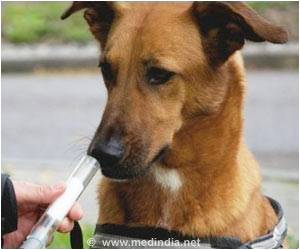Therapy dogs have been found to assist in reducing symptoms of attention-deficit/hyperactivity disorder (ADHD) in children, finds a new study. A therapy dog is trained to provide affection, comfort, and love to people in stressful situations and sometimes to people with anxiety disorders or autism.

‘Therapy dogs can hasten the treatment response into something very meaningful In addition to this the fact that parents of the children who were given this Therapy dogs assistance reported fewer problem behaviors over time than those treated without therapy dogs.’





Results from Schuck's research indicate children with ADHD who received the canine assisted intervention (CAI) experienced a reduction in inattention and an improvement in social skills. And, while both CAI and non-CAI interventions were ultimately found to be effective for reducing overall ADHD symptom severity after 12 weeks, the group assisted by therapy dogs fared significantly better with improved attention and social skills at only eight weeks and demonstrated fewer behavioral problems. No significant group differences, however, were reported for hyperactivity and impulsivity. "Our finding that dogs can hasten the treatment response is very meaningful," said Schuck. "In addition, the fact that parents of the children who were in the CAI group reported significantly fewer problem behaviors over time than those treated without therapy dogs is further evidence of the importance of this research."
Guidelines from the American Academy of Pediatrics for the management of ADHD underscore the importance of both psychopharmacological and psychosocial therapies. Patients who receive psychosocial therapy prior to medications have shown to fare better. Additionally, many families prefer not to use medications in young children.
"The take away from this is that families now have a viable option when seeking alternative or adjunct therapies to medication treatments for ADHD, especially when it comes to impaired attention," said Schuck. "Inattention is perhaps the most salient problem experienced across the lifespan for individuals with this disorder."
This study is the first known randomized controlled trial of CAI for children with ADHD. It illustrates that the presence of therapy dogs enhances traditional psychosocial intervention and is feasible and safe to implement.
Advertisement
Source-Eurekalert















